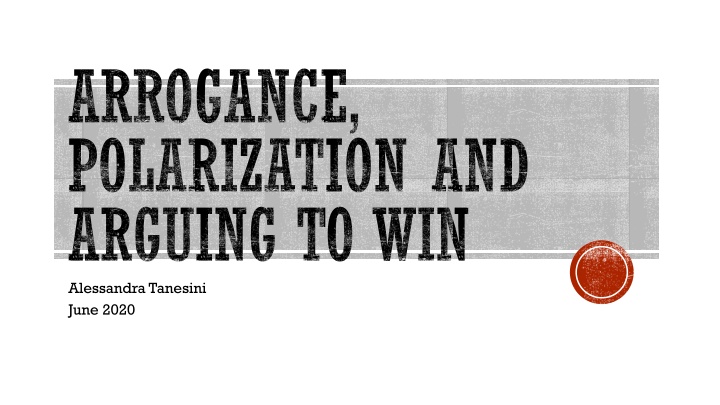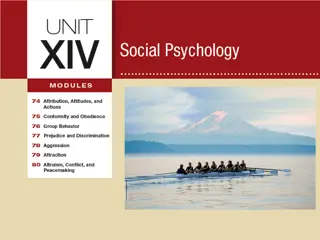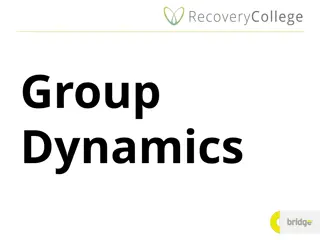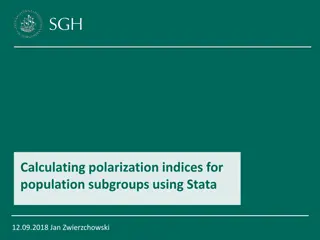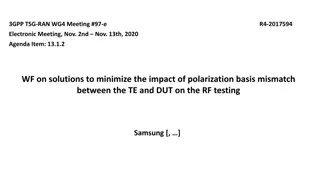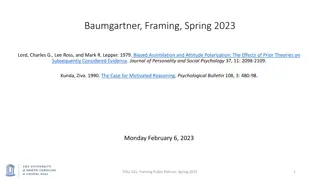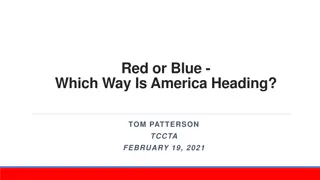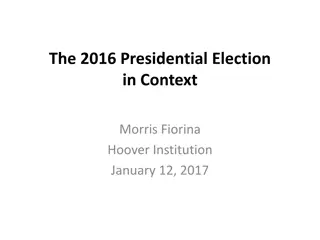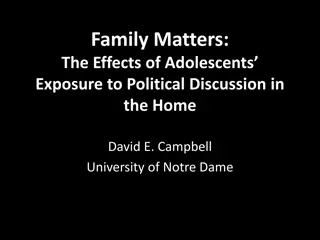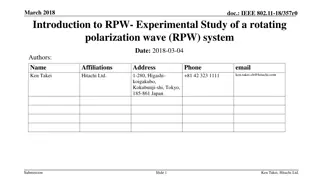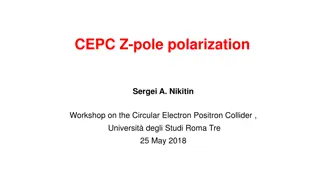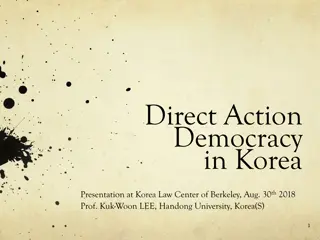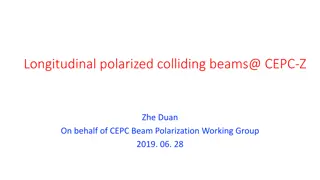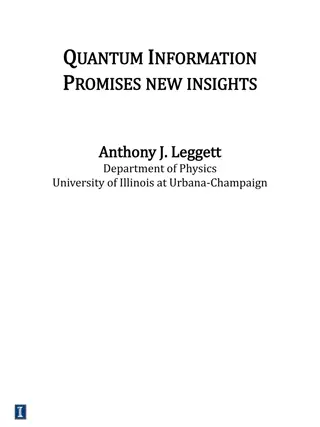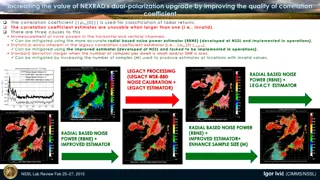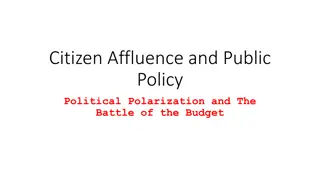The Impact of Arrogance and Polarization on Group Deliberation
Individuals' biases and tendencies towards arrogance and overconfidence can hinder good group deliberation. The motivation to argue for learning, rather than winning, contributes to better group discussions. Understanding biases as features rather than bugs can lead to improved group judgment. Individual reasoning biases can actually promote high-quality group decision-making. Recognizing the role of myside bias in information search within groups can enhance the overall quality of deliberation.
Download Presentation

Please find below an Image/Link to download the presentation.
The content on the website is provided AS IS for your information and personal use only. It may not be sold, licensed, or shared on other websites without obtaining consent from the author.If you encounter any issues during the download, it is possible that the publisher has removed the file from their server.
You are allowed to download the files provided on this website for personal or commercial use, subject to the condition that they are used lawfully. All files are the property of their respective owners.
The content on the website is provided AS IS for your information and personal use only. It may not be sold, licensed, or shared on other websites without obtaining consent from the author.
E N D
Presentation Transcript
ARROGANCE, POLARIZATION AND ARGUING TO WIN Alessandra Tanesini June 2020
Empirically informed philosophical arguments that policies of steadfastness and overconfidence in the face of disagreement facilitate good quality group deliberation are unconvincing. MAIN POINTS On the contrary, these arrogant-like disposition inhibit good group deliberation. The motivation to argue to learn (rather than to win) contributes to improved group deliberation.
Individual biases as features rather than bugs Policy of steadfastness as facilitating good group judgement by promoting dissent (Hallsson and Kappell, 2018) Overconfidence in individual judgment as facilitating good group judgment by promoting dissent (Levy, 2019) STRUCTURE Transient disagreement versus entrenched stalemate Groups as motivated processors Groups virtue out of individual virtue
Individual reasoning biases would promote high-quality group judgment and decision- making (Hallsson and Kappel, 2018; Alfano & Sullivan, forthcoming; Levy 2019 and forthcoming; Levy and Alfano, 2019). These individual biases facilitate seemingly intellectually vicious debating behaviours such as being overconfident in one s own views and refusing to update one s beliefs in the light of counter-arguments offered by other discussants. VIRTUE OUT OF VICE These biases affect information search, evaluation, retention and dissemination They (or at least some of them) trip up individuals when reasoning alone
Mercier & Sperber (2017) have argued individual reasoning is deeply biased. We find it easier to pile up reasons for our view than to think of objections to it. Why would reasoning have evolved if it is so bad? FEATURES NOT BUGS Its function is not to find out the truth but to persuade. Within a group with diverse views being good at persuading promotes good collective judgment because of divisions of cognitive labour
Myside Bias (Mercier & Sperber, 2017, ch.10) A bias of information-searches: people find it easier to supply reasons for their views, and against opposing views than the other way round. A Motivational bias: motivated or directional questions cause the biased search (Kunda, 1990). It might have been mis-characterised as confirmation bias. MY-SIDE BIAS AS FEATURE Provided there is initial diversity of views myside biases promote better information search in groups: One person searches for all the reasons for p and against not-p; the other searches for all the reasons for not-p and against p. This secures a wide search without duplication of effort
Overconfidence in individual success as opposed to group success as measured by underestimating how often groups get the right answer and overestimating what proportion of individuals succeed (Mercier et al 2015). Overconfidence biases information dissemination. It improves group judgement by preventing informational cascades, where group members self-silence and follow the majority even though they might possess important counter-evidence, that lower the quality of group deliberation (Sunstein, 2006, ch.4) Overconfidence in one s own individual ability and underestimation of the likely correctness of emerging consensus inhibits the formation of cascades. Information dissemination is, thanks to the overconfidence bias, more efficient especially in the case of hidden profiles. OVERCONFIDENCE AS FEATURE
Group judgment and decision-making involves evaluating the information made available to the group by Information searches carried out by individuals Information dissemination carried out by individuals With regard to information evaluation Mercier and Sperber (2017, ch.12) emphasise individuals unbiased sensitivity to argument quality (Hahn & Oakesford, 2007) VIRTUE OUT OF VICE? So groups would do best when Biased information searches reduce duplication Biased information dissemination reduces self- silencing or premature consent Unbiased information evaluation produces good quality judgment or decisions
Two senses of bias: Systematic error Any disposition that reduces in a non-evidential way the hypothesis space (Antony, 2016, p. 161) WHAT IS A BIAS? My-side bias is a bias in the second epistemically neutral sense. It can contribute to error only when combined with biased (in the first sense) information evaluation that settles on belief too quickly.
Focus has been on cases with features that make them unusual in ordinary contexts: are purely factual and rather simple have a unique and wholly correct answer (there is not more than one side to it) LIMITATIONS OF RESULTS SO FAR the correct answer is self-evident to all once it is explained groups engage in systematic deliberations rather than rely on heuristics individuals in groups are motivated to cooperate, rather than pursue self-interest
Comparing groups and individuals judgement for epistemic quality gives mixed results. Groups can solve problems that none or few of the members could solve alone (Moshman and Geil, 1998), can reach better judgements than individual members (Fraidin, 2004; Laughlin, Hatch, Silver, & Boh, 2006), can be more creative than individual members (Hambrick & Mason, 1984) Groups can also become polarised (Sunstein, 2006), make worse decisions than most of their members would make alone (Tetlock, Peterson, McGuire, Chang, & Feld, 1992), settle on worse judgments (Kerr & Tindale, 2003), be less creative than individuals (Diehl & Stroebe, 1987) INITIAL DOUBTS ABOUT RESULTS This suggests that personality and situational variables that influence group dynamics, rather than universally shared cognitive biases are determinant of the epistemic quality of group- judgements
It is rational to adopt a policy of steadfastness in one s belief (irrespective of truth) in the face of disagreement when the policy leads to the epistemically best outcome for the deliberating group (Hallsson and Kappel, 2018) Presumption: there are cases like this Argument: Cognitive divisions of labour are epistemically beneficial to group deliberation. Disagreement promotes cognitive division of labour given the universally shared my-side bias because it widens information searches (Schulz- Hardt et al., 2000. The adoption of a policy of steadfastness promotes disagreement. Therefore, It is rational to adopt steadfastness as a policy even though It recommends believing in ways that do not accord with the evidence seemingly arrogant behaviour STEADFASTNESS
It is rational to be overconfident in the likely correctness of one s views versus majority s opinion because it promotes an epistemically better outcome for the deliberating group (Levy 2019) Argument: Overconfidence facilitates adopting a minority position against an emerging consensus Groups that (prior to deliberation) include minorities are more likely to discover the solution to a problem in cases of hidden profiles (Schulz- Hardt et al., 2006) Therefore, overconfidence promotes better quality information dissemination. Hence, It is rational to be overconfident even though It recommends believing in ways that do not accord with the evidence seemingly arrogant behaviour OVERCONFIDENCE
Policies of steadfastness promote stalemates Formal arguments for the value of disagreement (as opposed to mere aggregation of diverse independently reached opinions) rely on its transience (Zollman, 2010). Groups do best when they either include members with extreme and diverse views or include asymmetries of information (but not both) When one such feature is present, there is beneficial transient disagreement in the group When both are present, there is entrenched disagreement and stalemate Cases of steadfastness in disagreement mimic extremity through resistance to counter-evidence Division of cognitive labour guarantees asymmetries of information Hence, these are cases where disagreement is entrenched which is epistemically bad for the deliberating group OBJECTION 1: STEADFASTNESS AND STALEMATES
Steadfastness in ones views irrespective of their truth can only be psychologically sustained when one is motivated to win the argument. The motivation to win is psychologically incompatible with the motivation to cooperate. Individuals motivated to win are prone to denigrate others views (Fisher & Keil, 2016) to spin and to deceive (De Dreu et al. 2008) Unsurprisingly, Arguing to Learn outperforms Arguing to Win as a strategy on collective deliberation. Persistent disagreement is not epistemically valuable in group judgement or decision-making, since it promotes stalemates rather than convergence on the truth (Fisher & Keil, 2016). Steadfastness in the face of disagreement would seem to promote persistent disagreements rather than transient disagreements and thus does not promote better collective deliberation. That is, group deliberation does not yield epistemic benefits if the deliberators adopt a policy of steadfastness in their believing. OBJECTION 2 THE ROLE OF MOTIVATION IN STADFASTNESS
Cooperative motivation is also psychologically incompatible with overconfidence in one s own individual abilities over the abilities of the group Persistent overconfidence in one s own opinions should lead to attitude certainty and subsequently to self-certainty (Clarkson et al 2009) Attitude certainty is predictive of resistance to persuasion which in turns makes one s attitude more certain (Tormala, 2016; Tormala and Petty, 2004) and more extreme (Howe and Krosnick, 2017) We should expect persistent overconfidence to produce belief polarisation That is, group deliberation does not yield epistemic benefits if the deliberators are overconfident in their own individual abilities OBJECTION 3 OVERCONFIDENCE, MOTIVATION AND BELIEF POLARISATION
Empirical work on the benefits of disagreement presupposes that group members are motivated to cooperate and are not merely arguing to win There is significant evidence that groups whose members are motivated to cooperate and thus desire the best outcome for the group perform better in conditions of systematic deliberation than groups whose members are motivated to compete against each other (De Dreu et al. 2008 for a review). VIRTUE OUT OF VIRTUE Openness to others views, ability to see the other side in group discussion promotes better outcomes than steadfastness Individual virtue rather than vice promotes group level virtue because it promotes unbiased evaluation
